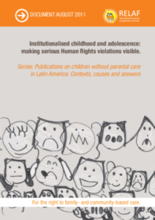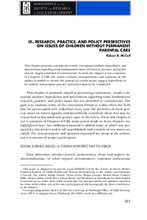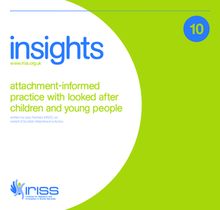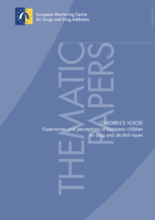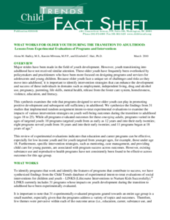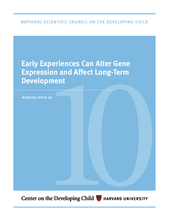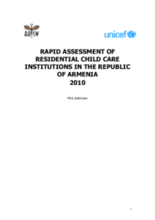Displaying 421 - 430 of 496
This chapter of Monographs of the Society for Research in Child Development Volume 76, Issue 4 is devoted to the analysis of the ill effects of early institutional experiences on resident children's development.
This paper, produced by RELAF, is part of a series of publications on children without parental care in Latin America: Contexts, causes and answers. This document, and others in the series, pertains to the broad topic of children without parental care and examines the particular situation of institutionalised children.
This chapter presents conclusions, trends, conceptual analyses, hypotheses, and speculations regarding some fundamental issues of research, practice, and policy that are largely unsettled or controversial, regarding children without permanent parental care.
This toolkit presents a compendium of research on how Albertans think about the issues of early childhood development, and how to increase public support for policies and programs that support healthy child development.
This document stresses the importance of healthy attachments for children, especially looked after children. It provides an overview of attachment theory, presents the policy context of looked after children in Scotland, outlines the evidence on effective interventions for children in care and their families, and highlights findings and practice implications.
The purpose of this paper is to give meaning and insight into some of the key drug and alcohol issues that affect children from the perspectives of the children themselves. Research shows that large numbers of children who are separated from their parents are particularly vulnerable to developing drug and alcohol problems. Special attention is paid throughout the report on children looked after by relatives, foster carers, and institutions.
This compilation provides policymakers, programme managers, non-governmental organizations and others interested in implementing family skills training programmes with a review of existing evidence-based family skills training programmes. Its purpose is to provide details of the content of such programmes, the groups targeted, the materials used and the training implemented, in order to assist users in selecting the programme best suited to their needs and to offer guidance as to the kind of programmes available.
A new Child Trends fact sheet examines the role that programs for older youth can play in promoting positive development and subsequent self-sufficiency in adulthood.
This in-depth working paper explains how genes and the environment interact, and gives recommendations for ways that caregivers and policymakers can effectively respond to the science.
The study covers all residential child care institutions operating in Armenia, with the purpose of creating a basic baseline for further analysis required for the progressive reduction of placement of children and the development of alternative child care services. The aim of the assessment is to verify the situation of each child in relation to their families, and the respect of their entitlements related to their specific condition.

